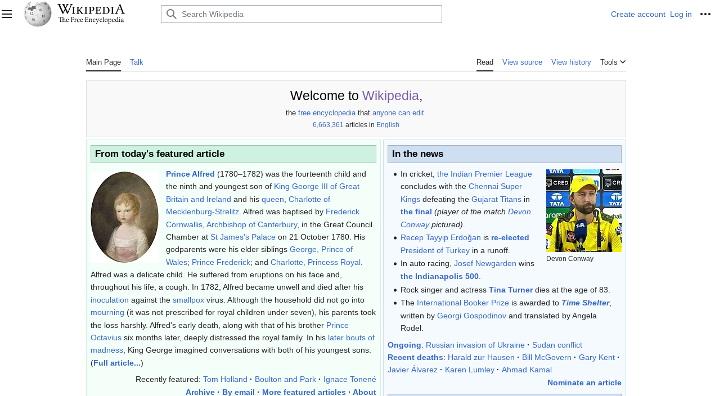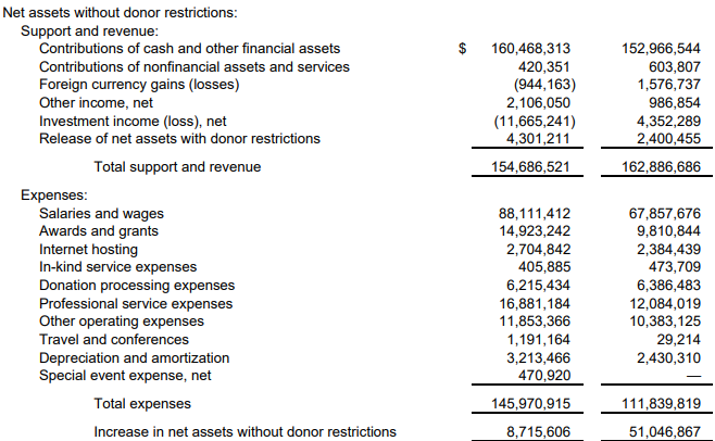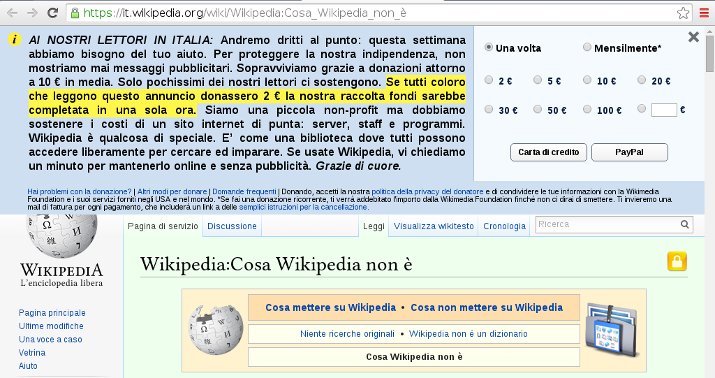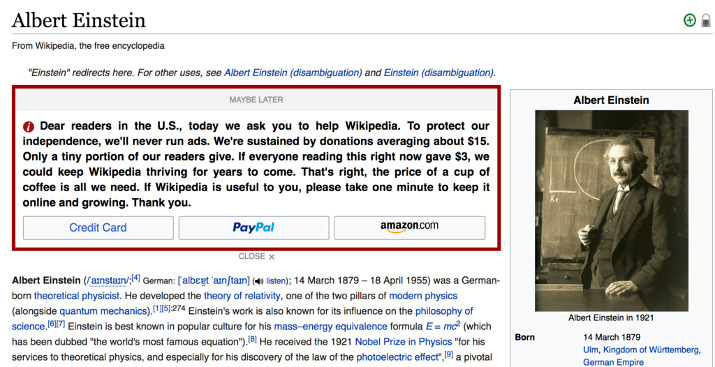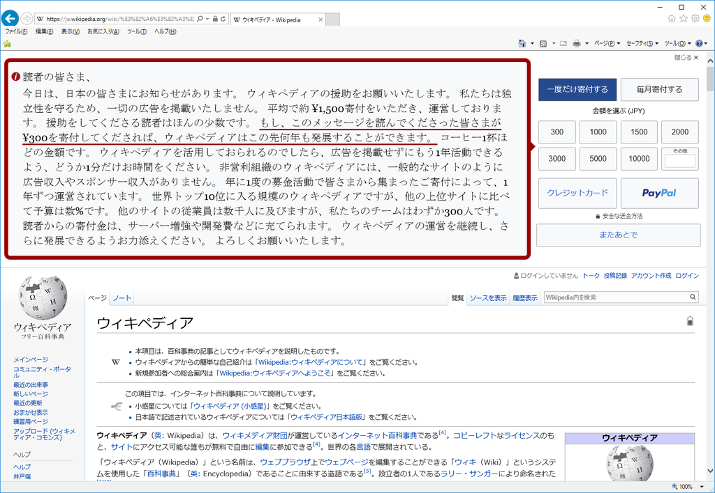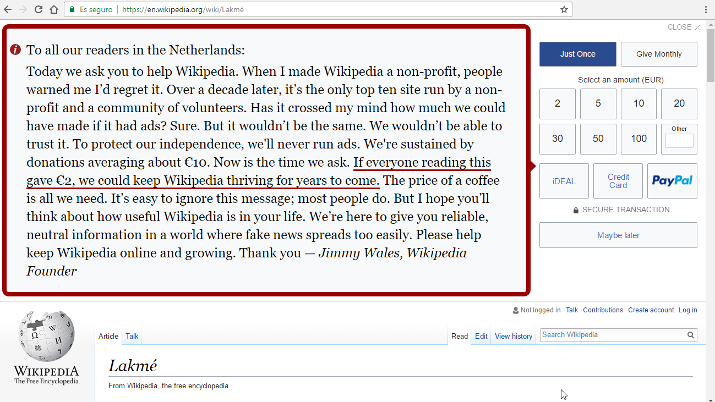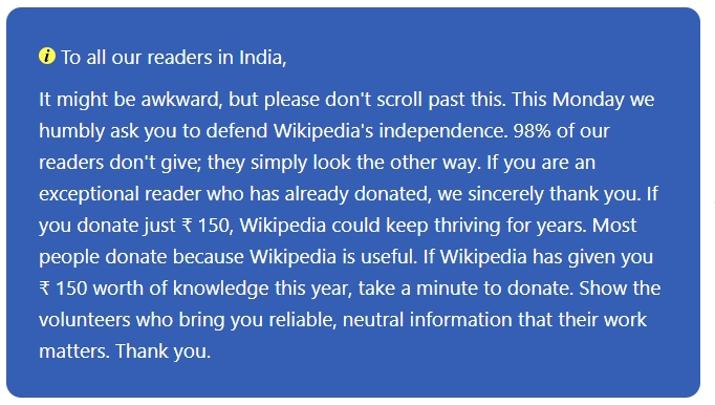Almost everyone is aware of Wikipedia. It’s one of the largest sites in the world, and you’ll usually find it on the top of the Google search results for any particular topic, typically in the first, second, or third place.
Wikipedia is a free online encyclopedia that is written and maintained by a team of volunteer contributors who edit pages and add sources. While anyone can contribute and edit a page, you can verify that the information written is accurate by looking at the provided reference.
Since it’s such a large site with so much content, and since it is generally considered authoritative, it ranks well on Google.
According to SimilarWeb, it is the 9th most popular site in the world and ranks first in the Dictionaries and Encyclopedia category in the US. It also gets around 4.5 billion visits per month!
If you’ve visited Wikipedia often enough, you will have noticed that it asks for donations from time to time. Every once in a while, there will be a period of a few weeks in which Wikipedia has a large banner at the top of the page, asking for just a few dollars from each reader.
It sounds like a pretty small price to pay for all the free information you get from Wikipedia. You might be tempted to contribute – after all, Wikipedia is a nonprofit, so it must need your help, right?
You might also wonder if Wikipedia is going broke. If it is constantly begging its users for just $2, it must really need that money, or so you might think.
The truth is actually quite shocking.
In this article, you’ll learn why you shouldn’t feel bad about ignoring Wikipedia’s requests for donations. You’ll also learn the true financial state it is in (hint: no, Wikipedia doesn’t really need your money).
Read on for the juicy story.
Also Read: Unethical Nonprofit Organizations Examples
Financial Structure of Wikipedia
Wikimedia Foundation, CC BY-SA 3.0, via Wikimedia Commons
Before we get into things, let’s first take a closer look at Wikipedia’s financial model. How does it get its money?
Wikipedia is run by the Wikimedia Foundation. The Wikimedia Foundation is a nonprofit charitable organization based in San Francisco, California, that hosts Wikimedia as well as several other popular “wiki” projects, including:
- Wiktionary
- Wikibooks
- Wikimedia Commons
- Wikivoyage
- And others
Note that WikiLeaks, despite starting with “wiki,” is NOT associated with the Wikimedia
Foundation in any way.
The Wikimedia Foundation was incorporated in 2003, two years after Wikipedia was created (in 2001 by Jimmy Wales and Larry Sanger) and a few months after Wiktionary was created.
So, how does the Wikimedia Foundation get its money? It runs mostly on donations from the public, which it gets through appeals on Wikipedia (the ones you see asking for $2).
However, it also gets grants from philanthropic organizations, philanthropists like George Soros, and tech companies like Amazon and Facebook. It also gets quite a few grants from other foundations and even gets federal grants.
In 2016, the Wikimedia Foundation decided to create the Wikimedia Endowment, a fund that was designed to store money to safeguard the future of Wikipedia.
This endowment fund is managed by the Tides Foundation and received numerous grants, such as:
- $1 million donation from Amazon
- $1 million gift from Facebook to support the future of free knowledge
- $2 million from George Soros
- A total of $8.5 million from Peter Baldwin and Lisbet Rausing
- $1 million from Craig Newmark (one of the first donors to the Wikimedia Endowment)
- $2 million from Google
According to the Wikimedia Foundation, it reached its goal of obtaining $100 million in the Wikimedia Endowment fund in 2021.
In addition to money going directly to the Wikimedia Endowment fund, various donors have given the Wikimedia Foundation money. For example, the Sloan Foundation gave the Wikimedia Foundation $3 million back in 2008.
The Wikimedia Foundation uses these donations to run Wikipedia as well as its other projects, like Wiktionary.
Check Out: Best Kickstarter Alternatives
Financial Challenges Faced by Wikipedia
Meganhernandez, CC BY-SA 4.0, via Wikimedia Commons
So, what does Wikipedia need all that money for? What are the exact costs of running Wikipedia, and why does it keep asking for donations?
Of course, hosting such a large site as Wikipedia does cost money. The truth, though, is that since Wikipedia is written by volunteers, it doesn’t cost as much money to run as you might think.
In 2013, Erik Moller, who was then the Vice President of Engineering of the Wikimedia Foundation, estimated the total running costs of running Wikipedia at just $10 million a year, as per The Daily Dot.
I suppose that with new content always being added to the site, there are increased costs associated with expanding server infrastructure and bandwidth requirements. However, as I will demonstrate later based on the Wikimedia Foundation’s 2022 audit report, the cost of maintaining its servers isn’t that high.
According to Unherd, while Wikimedia reached its goal of $100 in its Endowment Fund in 2021, in total, it raised a lot more than that. In its decade of fundraising, it managed to collect $400 million!
Unherd estimated that Wikipedia can run quite comfortably for at least another 20 years using the donations it currently has without needing to fundraise another penny. Instead, it is spending quite a bit of money on its employees, of which it has around 500-600, with top-tier managers earning up to $400,000 a year – quite a comfortable salary.
According to The Daily Dot, over 40 employees are hired to work on fundraising alone, and they get paid well for that.
Check Out: Short Donation Messages Examples
Wikimedia fundrising team mostly, CC BY-SA 3.0, via Wikimedia Commons
Of course, there are potential limitations to relying only on grants. Without monetization, you might argue, the Wikimedia Foundation must continue to fundraise and collect donations to protect its future outlook.
Wikipedia has always taken a stance against donations and promised never to allow ads on its site. That is great for the user experience – who likes ads?
Besides, allowing ads on the site would create a potential for a big conflict of interest. Wikipedia wants to provide unbiased and accurate information, and if it allowed ads, it may not be able to do that.
The only ads it does allow on the site are the periodic fundraising ads put up by the Wikimedia Foundation itself.
While people have suggested other forms of revenue, such as licensing content to Google, Wikipedia currently does not have any source of revenue other than grants and donations from the general public and private organizations.
However, given what we know about how much money the foundation already has in its coffers, that’s not a viable argument to support the constant fundraising from the public.
That’s especially true when you remember how those ads make Wikipedia look cash strapped and in dire need of funds.
The ads appeal to you “not to scroll away” and make it seem like the nonprofit really needs your money to survive – when it doesn’t at all.
According to the Washington Post, Wikipedia once raised enough money in a single day of its fundraising campaigns to power its servers for 66 weeks.
So, let’s go back to Wikipedia’s expenses. What exactly is taking up the majority of Wikipedia’s budget?
We know it’s not for paying contributing writers and editors, as they are all volunteers who volunteer their free time to make Wikipedia the massive library of information that it is.
Is it hosting the massive site? Does maintaining its servers really cost that much these days?
Gregory Varnum / Wikimedia Foundation, CC BY-SA 4.0, via Wikimedia Commons
According to Jack Ryan of MakeUseOf, millions of dollars of the Wikimedia Foundation’s budget are going every year for expenses that are probably unnecessary. Those include expensive an downtown office in San Francisco (the Wikimedia office in San Francisco is pictured above this paragraph) and organizers who organize events and workshops to celebrate Wikipedia.
I took a look at the Wikimedia Foundation’s 2022 audit report, and I found that very little cash is being spent on hosting.
Around $155 million was raised in 2022 after accounting for things like the release of assets with donor restrictions and foreign currency exchange losses.
Only around $2.7 million out of that $155 million was spent on server hosting expenses. That is less than 1.8% of the total money it raised that year!
Meanwhile, it spent over $88 million on salaries, which is well over half of what it fundraised that year. If managers are getting hundreds of thousands of dollars a year in salaries, couldn’t their salaries be cut instead of asking for more donations?
Do the managers really need $400,000 a year to run an NGO? It seems like the Wikimedia Foundation is going the way of other nonprofit organizations that are misusing donations for extravagant salaries for its executives.
That year, the Wikimedia Foundation also spent nearly $1.7 million on travel, conferences, and special events. That might not seem like a lot out of its total budget, but considering only $2.7 million was spent on hosting, you realize that it actually is a large sum.
At the end of the year 2022, the Wikimedia Foundation had almost $240 million in net assets.
Indeed, that is enough to last for a very long time if the server expenses are just $2.7 million a year. Just eliminate the expensive salaries, and the Wikimedia Foundation’s operating expenses will be a fraction of what they currently are.
That begs the question: Is Wikipedia asking for donations unnecessarily? Is it misusing its funds on events, salaries, and conferences that it shouldn’t be spending money on?
Should Wikipedia be cutting costs and reducing the above-mentioned expenses?
Financial Sustainability Efforts
Wikimedia Foundation, CC BY-SA 3.0, via Wikimedia Commons
Wikipedia relies on donations from the public and grants from tech companies and philanthropists to survive. It runs fundraising campaigns every year, in which it asks readers all over the world, including from poor regions like Latin America, to donate money.
Usually, the amount is very little. For example, in the US, Wikipedia typically asks for $3, $2, or somewhere in between. In the UK, it usually asks for £2.
Following is an ad it ran in Latin America.
Wikimedia Foundation staff, CC BY-SA 3.0, via Wikimedia Commons
You might think that most people do not donate, and you would be right. However, there are plenty of people who do donate, and a lot of people donate more than the suggested amount of a few dollars, so these fundraising campaigns are actually pretty successful.
Considering how much money Wikipedia has already amassed and how successful it is at collecting new donations from the public and charitable organizations, the current model seems pretty sustainable. Nevertheless, people have suggested other revenue models.
Some people, like Stephen Chapman of ZDNet, have made the case that Wikipedia could start monetizing itself with ads without losing its reader base and overall value. Most people, though, agree that Wikipedia would be better off without ads – what do you think?
It’s a moot argument, anyway, because Wikipedia has made it clear that it will never allow ads on the platform. Both keyword and banner advertising would present potential conflicts of interest that should be avoided if Wikipedia is to remain the kind of site it currently is.
So, what other alternative monetization methods might be available?
On the Wikimedia Meta Wiki, various alternatives have been suggested. They include:
- Selling Wikipedia-branded merchandise, such as t-shirts and caps.
- Putting a small donation button at the top of each page instead of only running fundraising campaigns with big banners only once in a while.
- Repackaging Wikipedia content as CDs or DVDs with extra content, such as videos, added in and then selling them, so people can consume information on various topics in such formats.
- Affiliate marketing – adding a link to Amazon, for example, at the top of the page. Amazon would then pay Wikipedia a commission of 5% or so for book sales made via the link. People who value Wikipedia could click on that link when they want to buy books just to support Wikipedia without spending extra money on donations.
While these models have been proposed by the community of contributors invested in Wikipedia, there is no indication that Wikipedia itself plans to adopt such measures. It seems like its fundraising campaigns are doing well, and Wikipedia is constantly collecting a lot more money than it actually needs, so why change things?
Financial Model and Sustainability – Criticisms and Concerns
Nemo bis, CC BY-SA 3.0, via Wikimedia Commons
Wikipedia has received a lot of criticism about its financial model, which depends heavily on fundraising. However, the criticism relates not to the sustainability of its current model but to the ethics involved.
According to Slate, around 87% percent of the funding that the Wikimedia Foundation collects comes from individual donations, not from philanthropic organizations. However, most people are unaware of what the money is truly being used for, and many seem to be under the impression that Wikipedia is in dire financial straits.
TSkaff (WMF), CC BY-SA 3.0, via Wikimedia Commons
A lot of editors and contributors to Wikipedia feel that Wikipedia is misleading its readers about the donations it is giving. In a community Request for Comment (RfC) thread on a Wiki forum called the Village Pump, there was a near-unanimous agreement that the fundraising banners Wikipedia were running were unethical because:
- They made it seem as if Wikipedia could not run without those donations
- They made it seem as if donations were helping volunteers
- The ads used guilt-tripping to convince people to donate
For example, one ad draft read, “Without reader contributions, we couldn’t run Wikipedia the way we do.” That implies that Wikipedia is going broke and under financial stress when the opposite is true – a senior Wikipedia editor, Jim Heaphy, told Slate that “the Wikimedia Foundation is rolling in cash.”
Remember, the Wikimedia Endowment fund reached its goal long ago, and Wikipedia continues to fundraise every year. The future of Wikipedia is not in peril.
In the Request for Comment thread, one contributor with the username SilkTork pointed out that running the servers costs just a few million dollars a year or so, while the Wikimedia Foundation’s total assets are well over that amount, which I demonstrated above as per the 2022 audit report.
That means that Wikipedia could run indefinitely – for our lifetime and much longer – without new donations if it only invested its assets in the actual costs of Wikipedia. However, Wikipedia instead spends dozens of millions on staff salaries, and the ads that imply that the user donations are necessary for Wikipedia to keep on running are thus incredibly misleading.
SilkTork therefore opposed all fundraising on Wikipedia altogether.
Halowand, CC BY-SA 4.0, via Wikimedia Commons
Contributor XenonNSMB stated that it is just “downright immoral” for the Wikimedia Foundation to make people with limited incomes donate under the assumption that Wikipedia will collapse if they don’t.
The ads use language such as “If you donate just $2.75… Wikipedia could keep thriving for years,” when the foundation has so much money already.
As you can see in the following image, a banner displayed in the Netherlands read “If everyone reading this gave €2, we could keep Wikipedia thriving for years to come.” That implies that Wikipedia needs those donations to continue operating, when it already has enough cash to “thrive for years to come.”
It used similar language in an ad, displayed earlier in this article, asking US readers to donate $2.
Magister Mathematicae, CC BY-SA 4.0, via Wikimedia Commons
A major criticism of Wikipedia is that the site is only what it is due to the hard work of volunteer researchers, editors, and writers all around the world. They include random people and people with prestigious degrees who help make Wikipedia the massive resource it is.
However, these editors are not compensated in any way. Now, we understand that Wikipedia is a nonprofit and is aiming to keep its costs low.
Knowing what we know now about how much money the Wikimedia Foundation has and how many unnecessary expenditures it has, however, that argument falls on its head.
TSkaff (WMF), CC BY-SA 4.0, via Wikimedia Commons
According to Andreas Kolbe on Wikipediocracy, not a single one of the Wikimedia Foundation’s official employees is tasked with fact-checking or evaluating content. None of your money will go to the volunteers who write, research, edit, and fact-check Wikipedia pages.
What about a fund that would support the contributors to the site – the researchers, writers, and editors? Should Wikipedia use some of the fundraising money to pay them instead?
I would argue that no. Wikipedia’s model seems to work well the way it currently functions.
There are numerous problems with paying editors. Firstly, the vast amount of money needed to pay editors for researching and fact-checking articles is actually something that could make Wikipedia harder to sustain in the future, especially as new pages and page sections get added, and the site continues to grow.
It could also potentially create conflicts of interest. If a company gave a big grant to Wikipedia, and Wikipedia then used that money to pay its editors, its editors might write content that is favorable to that company.
There are PR firms and freelancers who sell “Wikipedia services.” In other words, they promise to edit or create Wikipedia pages about firms or individuals in exchange for money.
They know how well Wikipedia pages rank and how much authority people give to them – most people trust Wikipedia without bothering to check the sources.
However, these people are third-party hucksters and PR agencies that have no relationship to Wikipedia or the Wikimedia Foundation.
Wikipedia’s current Terms of Service do allow paid editing, but it requires a disclosure so that people can be aware that the person who wrote the Wikipedia page or section was paid to do so (by a third party, not Wikipedia) and may have a conflict of interest.
Future Outlook
Wikimedia Foundation staff, CC BY-SA 3.0, via Wikimedia Commons
Wikipedia is in a good financial position, and it won’t be going broke anytime soon unless it starts spending even more money on unnecessary expenditures. It has a lot more money than it needs to survive for the next few decades and likely many more, even without additional fundraising.
Financially, Wikipedia is safe. The biggest threats likely come from government censorship, as various governments, such as China, Venezuela, Iran, and Turkey, have censored the site in the past, blocking access to the entire site or specific content.
Another threat, in my opinion, is the paid editing that the current ToS allow, as it makes the entire site less credible, even with disclosures being required.
Is Wikipedia Going Broke? A Recap
No, Wikipedia is not going broke. It might seem as if it is from the way it asks for donations and the language it uses in its fundraising banners.
However, Wikipedia is flooded with cash. It has a lot more cash than it will ever need over the next few decades – the question is what it will do with it.
Furthermore, we can reasonably expect Wikipedia to continue fundraising large sums of money each year.
If you’re worried about Wikipedia going broke, don’t be. It set up the Endowment fund for that very reason, and it reached its goal long ago, so it’s financially set for the foreseeable future.


